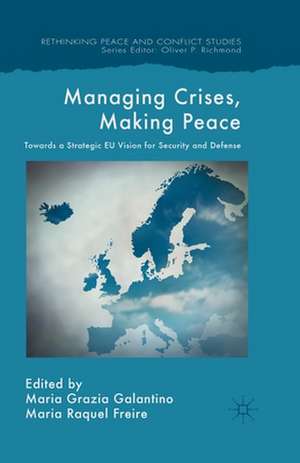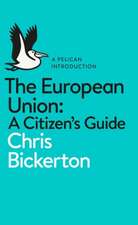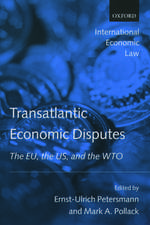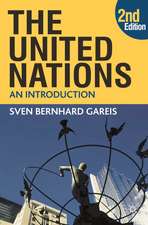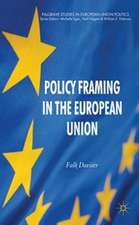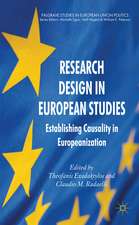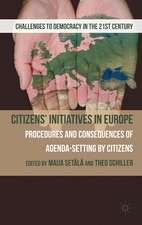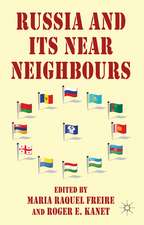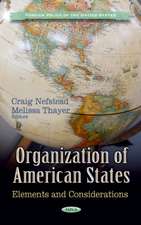Managing Crises, Making Peace: Towards a Strategic EU Vision for Security and Defense: Rethinking Peace and Conflict Studies
Editat de M. Galantino, M. Freireen Limba Engleză Paperback – 2015
| Toate formatele și edițiile | Preț | Express |
|---|---|---|
| Paperback (1) | 387.58 lei 6-8 săpt. | |
| Palgrave Macmillan UK – 2015 | 387.58 lei 6-8 săpt. | |
| Hardback (1) | 392.21 lei 6-8 săpt. | |
| Palgrave Macmillan UK – 28 mai 2015 | 392.21 lei 6-8 săpt. |
Din seria Rethinking Peace and Conflict Studies
-
 Preț: 357.93 lei
Preț: 357.93 lei -
 Preț: 113.00 lei
Preț: 113.00 lei - 15%
 Preț: 646.62 lei
Preț: 646.62 lei -
 Preț: 318.69 lei
Preț: 318.69 lei - 20%
 Preț: 565.31 lei
Preț: 565.31 lei -
 Preț: 272.92 lei
Preț: 272.92 lei -
 Preț: 387.20 lei
Preț: 387.20 lei - 15%
 Preț: 574.77 lei
Preț: 574.77 lei - 15%
 Preț: 699.45 lei
Preț: 699.45 lei -
 Preț: 390.63 lei
Preț: 390.63 lei - 15%
 Preț: 639.25 lei
Preț: 639.25 lei -
 Preț: 390.63 lei
Preț: 390.63 lei - 15%
 Preț: 644.30 lei
Preț: 644.30 lei -
 Preț: 390.63 lei
Preț: 390.63 lei - 15%
 Preț: 644.95 lei
Preț: 644.95 lei -
 Preț: 392.21 lei
Preț: 392.21 lei -
 Preț: 384.86 lei
Preț: 384.86 lei -
 Preț: 387.58 lei
Preț: 387.58 lei -
 Preț: 386.99 lei
Preț: 386.99 lei -
 Preț: 385.84 lei
Preț: 385.84 lei -
 Preț: 388.72 lei
Preț: 388.72 lei -
 Preț: 390.63 lei
Preț: 390.63 lei -
 Preț: 389.49 lei
Preț: 389.49 lei -
 Preț: 391.61 lei
Preț: 391.61 lei -
 Preț: 390.63 lei
Preț: 390.63 lei -
 Preț: 391.61 lei
Preț: 391.61 lei -
 Preț: 389.88 lei
Preț: 389.88 lei -
 Preț: 386.39 lei
Preț: 386.39 lei -
 Preț: 426.56 lei
Preț: 426.56 lei -
 Preț: 389.88 lei
Preț: 389.88 lei -
 Preț: 389.88 lei
Preț: 389.88 lei -
 Preț: 417.14 lei
Preț: 417.14 lei - 15%
 Preț: 699.93 lei
Preț: 699.93 lei -
 Preț: 392.60 lei
Preț: 392.60 lei -
 Preț: 389.11 lei
Preț: 389.11 lei - 18%
 Preț: 783.25 lei
Preț: 783.25 lei -
 Preț: 392.60 lei
Preț: 392.60 lei -
 Preț: 388.72 lei
Preț: 388.72 lei -
 Preț: 388.72 lei
Preț: 388.72 lei -
 Preț: 388.52 lei
Preț: 388.52 lei
Preț: 387.58 lei
Nou
Puncte Express: 581
Preț estimativ în valută:
74.16€ • 77.64$ • 61.37£
74.16€ • 77.64$ • 61.37£
Carte tipărită la comandă
Livrare economică 05-19 aprilie
Preluare comenzi: 021 569.72.76
Specificații
ISBN-13: 9781349495009
ISBN-10: 134949500X
Pagini: 297
Ilustrații: XVI, 297 p.
Dimensiuni: 140 x 216 mm
Greutate: 0.4 kg
Ediția:1st ed. 2015
Editura: Palgrave Macmillan UK
Colecția Palgrave Macmillan
Seria Rethinking Peace and Conflict Studies
Locul publicării:London, United Kingdom
ISBN-10: 134949500X
Pagini: 297
Ilustrații: XVI, 297 p.
Dimensiuni: 140 x 216 mm
Greutate: 0.4 kg
Ediția:1st ed. 2015
Editura: Palgrave Macmillan UK
Colecția Palgrave Macmillan
Seria Rethinking Peace and Conflict Studies
Locul publicării:London, United Kingdom
Cuprins
1. Introduction: The Role of the EU in International Peace and Security; Maria Raquel Freire and Maria Grazia Galantino PART I: CONCEPTUAL APPROACHES TO EU CRISIS MANAGEMENT 2. Peacekeeping Between Politics and Society; Fabrizio Battistelli 3. CSDP and Democratic Legitimacy: Public Opinion Support in Times of Crisis; Maria Grazia Galantino 4. Women in Peace Operations; Helena Carreiras 5. EU-NATO Relations on Crisis Management Operations: the Practice of Informality; Margriet Drent 6. A Functional Approach to the Construction of Peace: Including Natural Resources Management in (the Design of) EU Peace Operations; Bruno Hellendorff 7. Analysis of Stakeholders and Groups of Interests in Conducting European Union Peace Operations; Tsvetan Tsvetkov PART II: THE EU IN THE FIELD 8. EULEX Kosovo: the Test of Civilian Crisis Management in the EU; Marjan Maleši? 9. The EU's Role in Crisis Management: the Case of the EUMM; Maria Raquel Freire, Paula Duarte Lopes and Daniela Nascimento 10. Civilian Entities in EU Missions: Comparison of Slovenian, Italian, Belgian and Danish Approaches; Jelena Juvan and Janja Vuga 11. The EU and Protection of Civilians, a Distinctive Approach: the Case of EUFOR CHAD/CAR; Cristina Churruca 12. EUTM MALI: a Rapid Response Operation Launched in an Open Conflict; Bérangère Rouppert 13. The EU and Multilateral Peace Operations: After Afghanistan; Anthony King 14. Conclusion: Towards a European Vision on EU Peace Operations; Maria Grazia Galantino and Maria Raquel Freire
Recenzii
'How effectively can the EU respond to the wide array of challenges to global and regional security it faces? This impressive collection of essays provides unique insights into the capacities for and constraints on EU crisis management.'
Richard Caplan, Professor of International Relations, Oxford University
'As an integral part of the western bloc, the EU confronts a range of challenges as it attempts to manage crises on its frontiers and in former imperial spheres. This timely collection of essays offers important insights into the EU's peace operations and its Common Security and Defence Policy.'
Michael Pugh, Visiting Professor, Institute of Management Research,Centre for Conflict Analysis and Management, Radboud University Nijmegen, and Emeritus Professor University of Bradford
'Through a combination of wide-ranging conceptual papers and a series of empirical studies of EU operations, this book offers a serious and comprehensive account of the difficult emergence of an EU strategic vision for defence and security. A must-read for anyone interested in EU security studies, the making of institutional strategic culture and the management of international crises.'
Thierry Tardy, Senior Analyst, EU Institute for Security Studies
'With crises encroaching on the borders of the European Union while Europe is primarily preoccupied with its own concerns this book could not be more topical or relevant. The various strategic outlooks of the EU countries complicate the process of developing a strategic EU vision for defence and security, let alone integrating such policies into a comprehensive approach, a task that even traditional nation states find difficult. Managing Crisis, Making Peace focuses on one of the EU's main tools, relatively small civilian and military missions. Although these missions are very important to conflict management, they may fail to provide the EU with the capacity to act rapidly when large international crises occur. This book asks relevant questions about the EU's aims, ambitions, (exit) strategies, (comprehensive) approaches and how the EU relates to other actors in the field. By looking at these issues theoretically and by analysing a broad variety of empirical case studies at the implementation level, the book highlights issues that facilitate or hamper the construction of the EU's vision and role in peace operations. It illustrates the many issues that remain to be solved before the EU will be able to sustainably stabilize its neighbourhood, let alone areas further afield, and offers valuable insights for scholars and policymakers alike.'
Jaïr van der Lijn, Head of the Peace Operations and Conflict Management Team at the Stockholm International Peace Research Institute (SIPRI)
Richard Caplan, Professor of International Relations, Oxford University
'As an integral part of the western bloc, the EU confronts a range of challenges as it attempts to manage crises on its frontiers and in former imperial spheres. This timely collection of essays offers important insights into the EU's peace operations and its Common Security and Defence Policy.'
Michael Pugh, Visiting Professor, Institute of Management Research,Centre for Conflict Analysis and Management, Radboud University Nijmegen, and Emeritus Professor University of Bradford
'Through a combination of wide-ranging conceptual papers and a series of empirical studies of EU operations, this book offers a serious and comprehensive account of the difficult emergence of an EU strategic vision for defence and security. A must-read for anyone interested in EU security studies, the making of institutional strategic culture and the management of international crises.'
Thierry Tardy, Senior Analyst, EU Institute for Security Studies
'With crises encroaching on the borders of the European Union while Europe is primarily preoccupied with its own concerns this book could not be more topical or relevant. The various strategic outlooks of the EU countries complicate the process of developing a strategic EU vision for defence and security, let alone integrating such policies into a comprehensive approach, a task that even traditional nation states find difficult. Managing Crisis, Making Peace focuses on one of the EU's main tools, relatively small civilian and military missions. Although these missions are very important to conflict management, they may fail to provide the EU with the capacity to act rapidly when large international crises occur. This book asks relevant questions about the EU's aims, ambitions, (exit) strategies, (comprehensive) approaches and how the EU relates to other actors in the field. By looking at these issues theoretically and by analysing a broad variety of empirical case studies at the implementation level, the book highlights issues that facilitate or hamper the construction of the EU's vision and role in peace operations. It illustrates the many issues that remain to be solved before the EU will be able to sustainably stabilize its neighbourhood, let alone areas further afield, and offers valuable insights for scholars and policymakers alike.'
Jaïr van der Lijn, Head of the Peace Operations and Conflict Management Team at the Stockholm International Peace Research Institute (SIPRI)
Notă biografică
Fabrizio Battistelli, University of Rome, ItalyHelena Carreiras, University Institute of Lisbon, PortugalCristina Churruca, Universidad de Deusto, SpainMargriet Drent, University of Groningen, The NetherlandsPaula Duarte Lopes, University of Coimbra, PortugalBruno Hellendorff, Group for Research and Information on Peace and Security, BelgiumJelena Juvan, University of Ljubljana, SloveniaAnthony King, University of Exeter, UKMarjan Male i?, University of Ljubljana SloveniaDaniela Nascimento, University of Coimbra, PortugalBérangère Rouppert, Group for Research and Information on Peace and Security, BelgiumTsvetan Tsvetkov, University of National and World Economy, BulgariaJanja Vuga, University of Ljubljana, Slovenia
